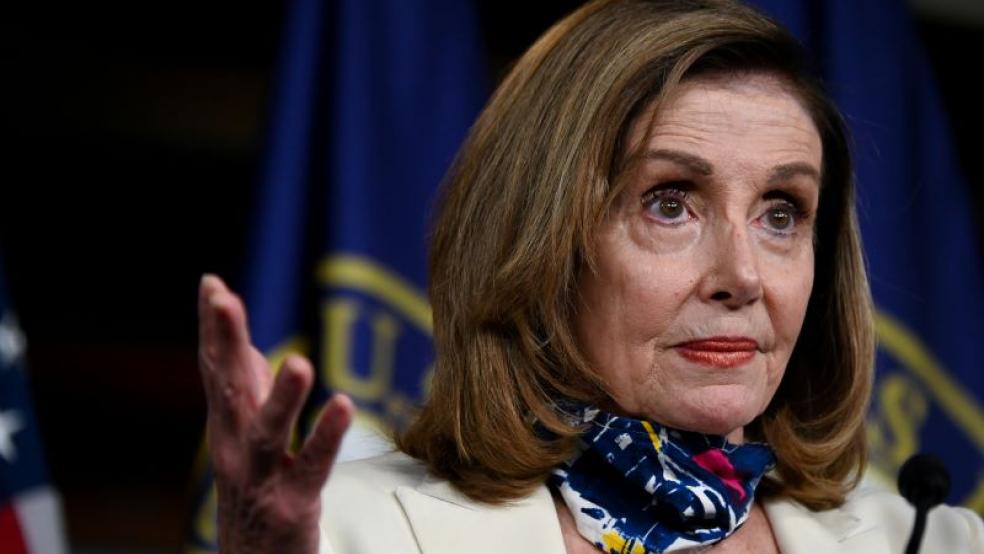It may not have a made-for-TV theme song, but Nancy Pelosi’s ultimatum does pack some dramatic punch: 48 hours or we’re done.
House Speaker Pelosi (D-CA) said Sunday that a deal must be reached within 48 hours if a coronavirus relief package is to pass before the election. “We don't have agreement in the language yet, but I'm hopeful,” she told ABC’s George Stephanopoulos. “I'm optimistic because, again, we’ve been back and forth on all of this.”
Pelosi and Treasury Secretary Steven Mnuchin have been going round and round over the potentially massive bill for weeks, with Democrats lowering their bid to $2.2 trillion and the White House offering a package worth $1.8 trillion. But money isn’t the only thing keeping the sides apart. Crucial details about specific provisions of the legislation are still in dispute, including the federal response to the still uncontrolled pandemic. “The testing. The tracing. The treatment. The mask-wearing. The separation. The sanitation. And all that goes with it,” Pelosi said.
In a call with Democratic leaders Monday, Pelosi said there were still numerous sticking points between the two sides, including aid for state and local governments, unemployment payments, child care funding and various health care provisions. The liability protections for businesses that Republicans want look like a particularly difficult issue, with one lawmaker reportedly saying that “there isn't a single Democrat who could vote for a bill with those provisions.”
Pelosi and Mnuchin “continued to narrow their differences” in a call on Monday afternoon, a Pelosi spokesperson said. “The Speaker continues to hope that, by the end of the day Tuesday, we will have clarity on whether we will be able to pass a bill before the election. The two principals will speak again tomorrow and staff work will continue around the clock.”
Trump says he wants even more: Over the weekend, President Trump said he would match the Democrats on spending, or even raise their offer. “I'd go higher than her number, who knows what her number is, but if you said a trillion-eight, two trillion, if you said two trillion-two, so many numbers — I'm willing to go higher than that, because it wasn't the people's fault,” Trump told Charles Benson of Milwaukee station WTMJ.
Trump is willing to “go pretty far” to make a deal, White House spokesperson Alyssa Farah said Monday, adding that the Trump team isn’t concerned about Pelosi’s timeframe. “This 48-hour deadline is really an artificial deadline. The American people need help. We’re going to get it to them whether it’s 72 hours, 24 hours or longer,” Farah said.
McConnell says he’ll consider it: Senate Majority Leader Mitch McConnell (R-KY) has been cool to Trump’s call for a major deal, saying instead that Senate Republicans would support a much smaller package, which he plans to bring up for votes this week. But McConnell did leave the door open, if only a crack, to a bigger deal: “If Speaker Pelosi ever lets the House reach a bipartisan agreement with the administration, the Senate would of course consider it.” (White House Chief of Staff Mark Meadows reportedly said that McConnell would bring any such deal to the floor for a vote – a step further than merely “considering” it – but McConnell has not confirmed that stance publicly.)
The odds are still very long: While the politicians keep talking up a potential deal, most observers have concluded that it will be very difficult to reach an agreement, at least before the election.
Politico’s Ben White said Monday that reaching a deal before the election “seems like a near impossibility.” While a deal is not entirely off the table, the signs all point to failure, despite the ongoing drama. “It all feels like theater of the absurd at this point,” White said Monday.
White also highlighted a comment from Isaac Boltansky of the investment bank Compass Point: “When it comes to the stimulus talks we are still where we have been for months: absolutely nowhere. Even the moments of slight progress . . . are little more than mirages in the swamp.”




